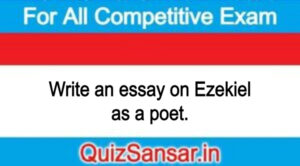
Write an essay on Ezekiel as a poet.
Write an essay on Ezekiel as a poet.
Ans.
One of the Most Notable Poets
Nissim is a versatile poet in the country. He is a poet of the city. Bombay, a poet of the body, and an endless explorer of the labyrinths of the mind. What distinguishes his poetry is the note of informality and frankness, the authenticity of expression and flawless craftsmanship. He is a poet who pursues the profession of poetry with a sense of commitment.
A Poet of the City Bombay
He is a poet of the city of Bombay. He does not mince words to expose the ugliness, dirt, wickedness, inhumanity and squalor of the metropolis. Such a city has a baneful influence on the poet. It is characteristic of Ezekiel that he finds most of the Bombaywallas rootless. Bombay, the symbol of any modern city, is the theme in a large number of his poems. The dehumanizing influence of the city on men’s individuality is described in Urban. The city dweller in this poem is closely attached to the city and its worn out tracks of custom and habit. He is always at a considerable distance from the hills which symbolize loftiness of spirit. His river of life is dry, and the winds lie dead in his path. He is devoid of the creative breath which has the power of regeneration.
Indianness in His Poetry
Nissim’s roots lie deep in India. He has not inherited the great classical tradition of India, of Vedas and Upanishads, but to the extent he has availed himself of the composite culture of India to which he belongs, he must be said to be an important poet, not merely in the Indian context, but in consideration of those that are writing poetry anywhere in India. The poet vividly and picturesquely depicts the rampant poetry, squalor, heat and ugliness of India, especially in big cities.
His Treatment of Love and Sex
Love and sex occupy a conspicuous place in Ezekiel’s poetry. He has dealt with love and sex in all its variety expression, meeting, indulgence, mating, fulfilment, consummation, fear, possessiveness, passion, surrender, misgiving, waiting, separation, wistfulness, yearning, praise, offering, thrill, joy, excitement and impatience. Ezekiel is a poet of the body, an endless explorer into the labyrinths of the flesh and desire. He has fascination for beauty, suffused with romance and freshness and not for city-cramped maidens.
A Poet of Ordinary Human Situations and Common Human Relationship
The poet has centered his attention most on the family relationship-the interaction between the poet and his immediate family wife, children and parents. He has written dispassionately about the bruises and balm, hurt and healing, rewards and pains of family life. Marriage, the most enduring of all human relationships finds a prominent place in his poetry. In Marriage, he describes the two main stages of marital life. The poet reaches the conclusion that husband and wife should try to create harmony, mutual understanding and acceptance for a successful and peaceful marital life.
Alienation and Search for Identity
The poet fully realizes that he cannot remain aloof from his environment. He says that a man can do something for and in his environment by being fully what he is, by not withdrawing from it. He has not withdrawn from India. Ezekiel suggests a synthesis of cultural polarities, which can enable a culturally alienated person ward off the haunting feeling of alienation and help him to find out his real identity.
As a poet, Ezekiel tries to explore his identity in a rural India, where he finds reality in the eyes of supple innocence. The poet tries to strike roots in the reality which is meaningful center of Indian life. He also explores his self in contemporary Indian realities. His love for India is clear, firm and unsceptical. For him India is not merely the crowds of the noisy city but the innocent, peace-loving masses.
His Wedding to an Individual System of Beliefs
Nissim attended the liberal Jewish synagogue in Bombay until he abandoned religion together after leaving school. This decision to abandon religion reveals a keen, rational and analytic mind wedded to an individual system of beliefs. He brings to the established tradition of love, religion and the passing hour the modern attitude of the need for a commitment. His attitude to religion is rational, logical, secular and humanistic. His religion is a religion of love and charity, ideals which every religion cherishes and preaches.
His Inclination towards the Worldly and Sensual Pleasures
Nissim does not ignore the worldly and sensual pleasures. He has a strong feeling of belonging to the world. He enjoys the world of eye and ear. Neither the world nor the flesh repels Ezekiel. He rather committed to both of them, and affirms his faith in them again and again. His poems reveal not only an awareness of his sinful self but also his constant pre-occupation with the Supreme Deity.
A Gifted Poetic Craftsman
Nissim’s poems are as a rule lucid-a merit these days-and are splendidly evocative and satisfyingly sensuous. He uses symbols and images which are highly evocative and suggestive. He stresses the importance of contemporary idiom. He deftly uses words from the common everyday vocabulary and by his use imparts to them a new meaning and new emotive significance.
-
Write the critical appreciation of the poem No. 12 entitled Far Below Flowed.
-
Write the critical appreciation of the poem No. 11 entitled Leave this Chanting.






